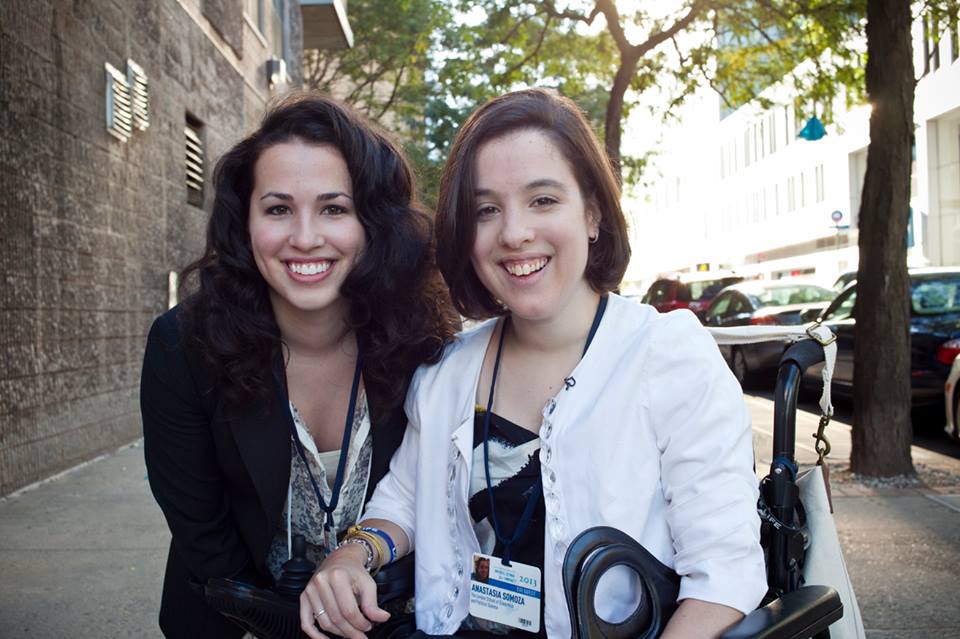
Disability rights advocate Anastasia Somoza addressed students with her mother Mary Somoza on Monday.
America’s health care and educational resources have struggled to meet the needs of disabled individuals, according to disability rights advocate Anastasia Somoza (COL ’07) and her mother Mary Somoza in an event hosted by the Academic Resource Center on international disability rights Monday.
Anastasia Somoza and her twin sister Alba Somoza were both diagnosed at the time of birth with cerebral palsy spastic quadriplegia, a condition that affects speech and motor control.
Since her graduation, Anastasia Somoza has undertaken numerous endeavors to advance disability rights around the world, including speaking at this year’s Democratic National Convention endorsing Democratic presidential candidate Hillary Clinton.
Besides completing a graduate degree at the London School of Economics, Anastasia Somoza currently works as a consultant with the Shield Institute, an organization that provides tools for people with intellectual and developmental disabilities, and has spoken to audiences in numerous countries.
Anastasia Somoza began her work in disability activism after her sister was placed in a class for students with disabilities at a public school. At Wednesday’s event, which was held in the Leavey Program Room, Mary Somoza said the system was ill-suited to cope with Alba Somoza’s disabilities. Students in the class had a range of needs and the teacher was overwhelmed.
“No teacher on this Earth could have taught all the different disabilities of the children that were in that classroom. Ranging from deaf-blind, to cerebral palsy, to Down syndrome, to autism, to emotional disturbance, everybody was packed in together,” Mary Somoza said. “Nobody was getting an education.”
In 1993, Mary Somoza received a message from the New York State Advocate for the Disabled inviting one of her daughters to represent children with disabilities at a town hall with President Bill Clinton. She accepted and sent Anastasia Somoza.
Anastasia Somoza said advocacy was a natural career choice for her growing up with a mother who spent her time advocating for her children.
“It happened naturally, because I grew up with her advocating for us,” Anastasia Somoza said. “I always recognized that I was able to do what I was doing in my everyday life as a child, as a teenager, as a young adult because of the help that I received from other people.”
Anastasia Somoza also said her experience at Georgetown highlighted challenges facing Georgetown’s resources for disabled students. Oftentimes, those assigned to assist her would not provide adequate service. Her shortcomings as a test-taker also affected her academics negatively.
Nevertheless, Anastasia Somoza learned to play to her strengths and find support in the resources available on campus and in the many friends she made at Georgetown.
“I’m so glad that I made the decision to come here,” Anastasia Somoza said.
Obtaining treatment for her daughters was a challenge, according to Mary Somoza, because of America’s health insurance system.
“Having grown up in the socialist environment in England, with free medicine and doctors, it appalled me that in the richest country on Earth, they didn’t have free medicine for all,” Mary Somoza said.
Mary Somoza said she was able to fight her way through the health care system to ensure that her daughters would receive appropriate medical care.
“I realized that one of the great things about the United States is that if you don’t like something, and you don’t like it bad enough, you can change it,” Mary Somoza said.
Academic Resource Center Director Jane Holahan said the Anastasia Somoza’s emphasis on self-care is an important lesson for all students to remember.
“Self-advocacy is key for all students, particularly for students with disabilities,” Holahan wrote in an email to The Hoya. “Learning how to communicate one’s needs is essential, and we — the ARC staff — want to assist students in developing their advocacy skills. Advocacy is embedded in the Academic Resource Center’s mission.”




















